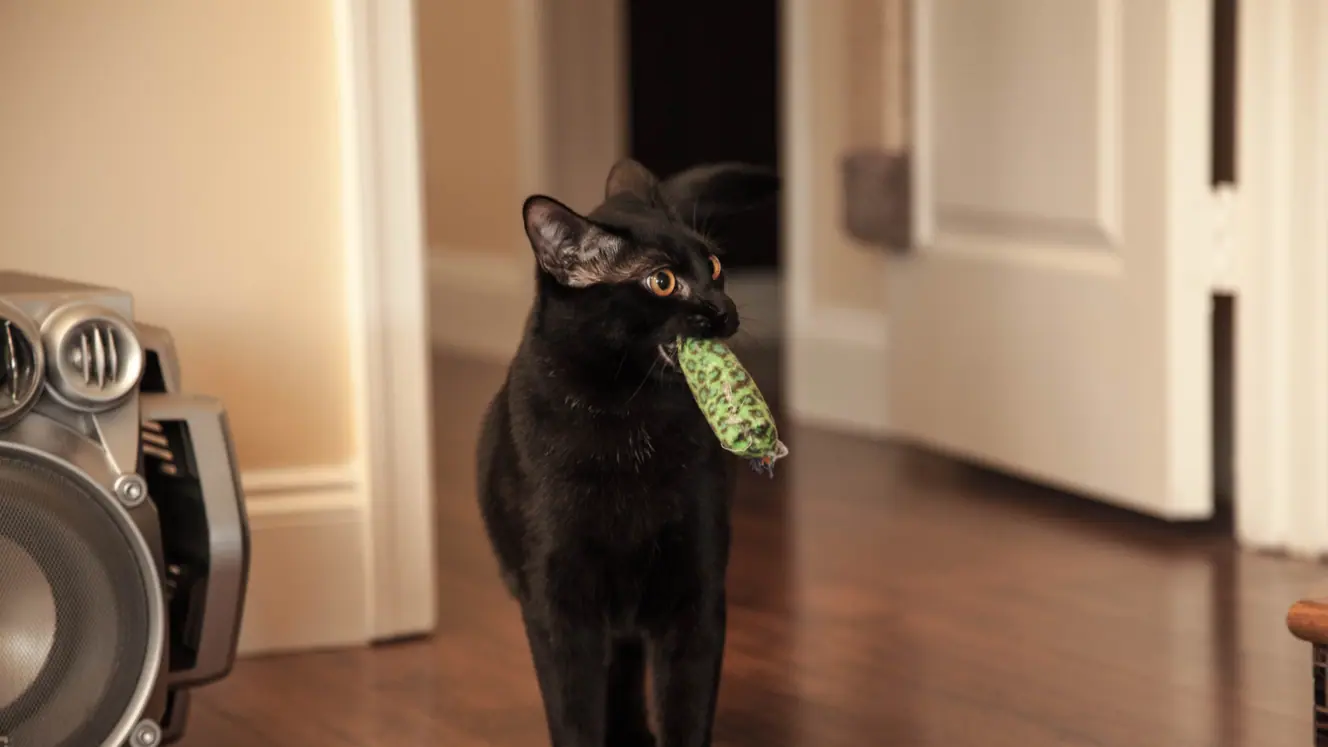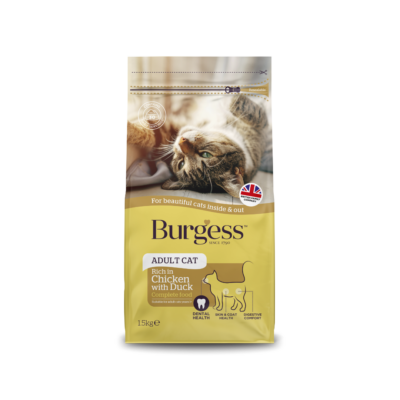
Fetch. It’s a game loved by dogs – right? Some canines enjoy nothing more than running after a half-chewed ball, dutifully thrown by their human, retrieving it, dashing back to drop it, before waiting impatiently for the game to start all over again.
But cats? Chasing and fetching objects as a pleasurable pastime? Surely not?
However, a new report – Fetching felines: a survey of cat owners on the diversity of cat fetching behaviour – reveals that cats fetching objects is more common than other noted cat behaviours including coming when called, meowing on command, or playing games.
Animal behaviour psychologists from the University of Sussex and Northumbria University surveyed 924 owners of 1,154 cats that play fetch to better understand this little-studied feline play behaviour.
Is fetch an instinctive behaviour in felines?
What was particularly interesting about the research was that almost all of the cats (94%) in the survey had not been trained to fetch. Most were young (less than one year old) when their owners first noticed they could fetch.
The key findings included:
- Fetching is a surprisingly common behaviour in cats, often emerging in absence of training
- Cats like to be in control of a game of fetch and respond best when they lead the play
- Playing fetch may be beneficial for cat welfare and the cat-owner relationship
Cats on the ball?
While felines may consider balls to be OK, researchers discovered that the majority of the cats surveyed (38%) preferred to play fetch with more interesting objects such as imitation mice and catnip toys.
Next most popular were spherical items – 25% of the surveyed cats would fetch baubles or crumpled up pieces of paper. Just under 10% preferred to fetch cosmetics, although some cats would opportunistically fetch common household items such as hair ties or bottle caps. Researchers say that this highlights “that it’s important to understand and respond to individual cat preferences.”
What’s more, with a cat sample made up of 994 mixed-breed and 160 purebred cats, the Siamese was noted as being the most proficient purebred fetcher.
Co-author of the research, Dr Elizabeth Renner, a lecturer in Psychology at Northumbria University, says: “To our knowledge this is the first study to focus exclusively on fetching behaviour in cats. It turns out that people are fascinated by this behaviour! We think it’s important because it demonstrates how much this behaviour is led by cats themselves, since very few of the owners surveyed explicitly trained their cats to fetch.”
Playing by the cat rules
The researchers looked at the particular ways that cats play fetch and found that they were more likely to play for longer and more frequently if they initiated the game.
Conversely, if their owners stopped the game of fetch, the cats were more likely to pursue repeat games. Typical – cats are renowned for making choices on their own terms!
They also found that the cats actively influenced the play behaviour of their owner – which could be seen as a bit of cat/human manipulation – something we know that they’re particularly good at, especially when it comes to feeding time...
For example, while some cats engaged in a traditional fetch and return routine, others would bring the object back only halfway, and some would gradually drop the object further and further away from their human. Does that sound like a cat you know who likes to change the rules of the game as they go?
The study’s lead author, Jemma Forman, a doctoral researcher in the University of Sussex School of Psychology, comments: "We've started to uncover a really interesting fetching behaviour that is not commonly associated with cats. Our findings show that cats dictate this behaviour to directly influence how their human owners respond. Cats who initiated their fetching sessions played more enthusiastically with more retrievals and more fetching sessions per month.”
Captivated by cats – many famous faces throughout history have been bewitched by felines >>
I’ll only play fetch here with this particular person...
Additional cat preferences for fetching were only playing in certain rooms of the house, such as the bedroom, or up and down the stairs, and only fetching for particular people. If you’ve ever experienced the stare, turn and ‘talk to the tail’ brush off, we feel your pain...
Jemma Forman adds: “This perceived sense of control from the cat’s perspective may be beneficial for the cat’s welfare and the cat-owner relationship. I’d encourage owners to be receptive to the needs of their cat by responding to their preferences for play – not all cats will want to play fetch, but if they do, it’s likely that they will have their own particular way of doing so!”
How do you know if your cat wants to play?
The researchers suggest: “When a cat wants their owner to play with them, they might bring a toy to their owner or sit next to a toy and stare expectantly at their owner. Examples of behaviour that shows a cat wants to end the play session include lying down, walking away from the area, or no longer chasing after a toy when it’s thrown. If owners can read and interpret the body language of their cat and know when to start or end a play session, the cat will enjoy this experience and may open up more playing opportunities in the future – perhaps even building up to fetch!”
This research echoes the thoughts of other feline experts who extoll the virtues of putting time aside to play with their cat each day.
Dr Sarah Ellis, Head of Cat Mental Wellbeing and Behaviour at feline wellbeing charity International Cat Care, urges owners to play with their cats for five minutes a day: “Our kitties benefit in so many ways from play, improving their physical and mental wellbeing.”
The charity adds: “Cats vary in their motivation to play, but all cats, if provided with the right opportunity, will play and benefit from the opportunity to do so, no matter what age. Understanding the specific likes and dislikes of your own individual will enable you to provide the best possible opportunities for play.”
It does us humans good too. Dr Ellis adds: “Watching our cats leap through the air and chase their favourite toys definitely gives us the feelgood factor.”
Learn lots of great things about your favourite feline
Researchers Forman and Renner conclude: “Owners can also learn about the needs of their cats through play sessions, such as how long they like to play for, and thus help strengthen their bond. It’s important for owners to put time aside to play with their cat each day. Short periods of play a few times a day are enough – and it doesn’t have to be a game of fetch. If cats enjoy playing fetch on their own terms, that probably applies to all kinds of play. Generally, they prefer toys that have features of prey – for example, toys that can break or pull apart, or that move erratically (like toys on a rod).”
Cats Protection says: “Why should dogs have all the fun when it comes to a game of fetch? Herbie proves that cats are just as good at retrieving their favourite toys – hunting is one of their specialist skills after all!” Watch Herbie the cat executing some purrfect fetching moves >>
What’s for dinner? After all that chasing and fetching, every cat deserves a delicious, nutritious dinner. At Burgess, all our cat food is made using premium ingredients and is high in protein, to ensure excellent quality and superior taste to help keep your cat happy and healthy – from kitten, to adult and mature and our award-winning variety for neutered cats.
CARE MORE Get more advice on caring for your cat from Burgess, the pet experts. Training, nutrition, grooming and general care. It’s all here >>
Is your cat a Burgess cat? Join the Burgess Pet Club for exclusive offers and rewards.
If you found this interesting, you may also like:
CAT BREEDS – TAKE A CLOSER LOOK AT SOME OF THE UK’S MOST POPULAR TYPES OF CAT Siamese or Bengal? Norwegian Forest or Maine Coon? Ragdoll or Russian Blue? Which breed of cat do you find most captivating? We count down 10 cat breeds that are riding high in the popularity charts, plus one favourite feline that’s not actually a breed at all …
HOW TO TELL IF YOUR CAT REALLY LOVES YOU While you may adore your captivating cat, how does your enigmatic feline companion feel about you?
CAT CONUNDRUMS Do you know what a female cat is called? Or why cats lick you? Why do cats purr? Why do cats knead? And is it true that cats only meow at humans, not at other cats? Test your feline knowledge with our fun cat conundrums quiz.
CARING FOR KITTENS Adorable bundles of fluff and mischief, kittens need dedicated care from their human to grow into healthy, happy adult cats.
WHY CATS LIKE THE HIGH LIFE! Is your cat a climber? Does your favourite feline always find a way to scale wardrobes, bookcases and even your curtains? Have you ever wondered why cats like to perch in high places?
CAN YOU TRAIN A CAT? Felines excel at training their human guardians to give them food, attention and a cosy lap to curl up on. But is it possible for us to train them?
EARLY LEARNING FOR KITTENS How we interact with, play with and ‘train’ a new kitten will have a big influence on their behaviour around people as an adult cat, so it’s important to go about it in the right way. We’ve plenty of top tips…
THAT DARN CAT! Some cat wanderers wind up in the most surprising places – what can you do to protect your adventurous feline
ENRICHING THE LIVES OF INDOOR CATS There are many different reasons why some cats are kept permanently indoors – such as cats with disabilities who may be blind or deaf, or because their owners live in a flat or by a busy road. Some older, more timid cats may prefer to stay warm and safe indoors, well away from the hazards of the great outdoors.
HOW CAT FRIENDLY IS YOUR HOME? While our human-centric homes may suit us just fine, what would our cats have to say on the matter?
LONG LIVE CATS! Although there are various factors beyond our control that influence how long a cat may live, such as genetic and hereditary predispositions to certain illnesses, there are plenty of things devoted owners can do to help their cat live a long, happy and healthy life.
ARE YOU AND YOUR CAT MORE ALIKE THAN YOU THINK? If you have a grumpy Tabby cat, a super friendly Ragdoll cat, or fiendishly feisty Bengal cat, could this actually say more about you than your pet?
DOES YOUR CAT KNOW THEIR NAME? Whatever name we choose to bestow upon our beloved pet cats, does it make any difference to them? Do they actually understand that they’re called Alfie or Bella or even Archibald von Snugglemuffin?
GIRLS v BOYS – FELINE MYTHS AND MISCONCEPTIONS Do male and female cats act differently because of their gender? Are generalisations about laid back, lap-loving boys and aloof, independent girls simply myths – or is there any truth to them?
10 THINGS I HATE ABOUT YOU If our feline friends could tell us what they really think, here’s what they’d probably say about some of the things we do that they’re none too happy about…

















